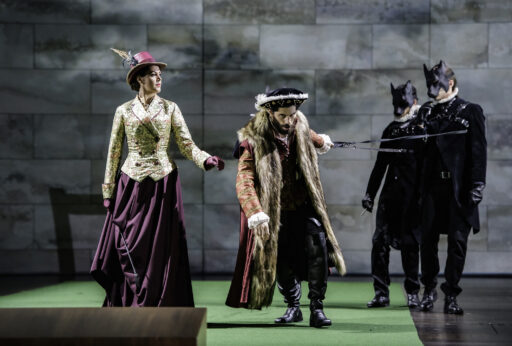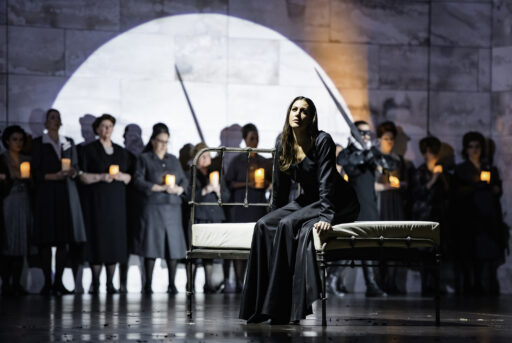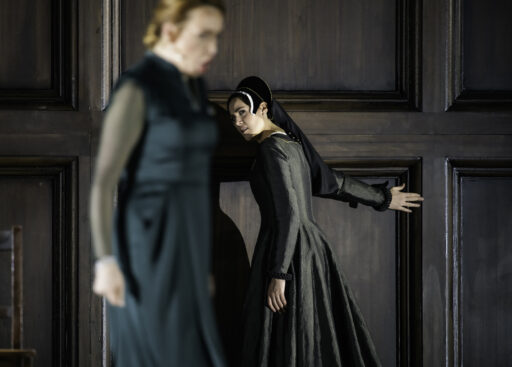Deutsche Oper Berlin, season 2023/2024
“ANNA BOLENA”
Tragedia lirica in two acts. Libretto by Felice Romani after “Henry VIII” (1791)
Music by Gaetano Donizetti
Enrico VIII. RICCARDO FASSI
Anna Bolena FREDERICA LOMBARDI
Giovanna Seymour VASILISA BERZHANSKAYA
Lord Rochefort PADRAIC ROWAN
Lord Riccardo Percy RENÉ BARBERA
Smeton KARIS TUCKER
Sir Hervey CHANCE JONAS-O’TOOLE
Little Elisabeth MIRABELLE HEYMANN
Orchester & Chor der Deutschen Oper Berlin
Extras of the Deutsche Oper Berlin
Conductor Enrique Mazzola
Chorus Jeremy Bines
Production David Alden
Stage and costumes Gideon Davey
Light Elfried Roller
Video Robi Voigt
Berlin, 15th December 2023
Anna Bolena by Gaetano Donizetti was both the breakthrough work of the composer and a great success of Giuditta Pasta, one of the most outstanding primadonnas of the 19th century. Anna Bolena, shortly followed by Bellini’s Sonnambula and Norma became the first roles composed for her voice in operas which are still performed today. All three belcanto parts were also sung by Maria Callas whose 100th birthday was on 2nd December. Her interpretation of Donizetti’s heroine in 1957 marked the final start of the Donizetti Renaissance. The new production at the Deutsche Oper Berlin is a co-production with the Opera House Zurich where it premiered two years ago. Director David Alden’s approach is  conventional with a mixture of realistic proceedings, subconscious mind, irony, sarcasm and black humour to some extent, which is a plus compared to most opera productions in Berlin. When the curtain rises, we see Anna’s daughter Elisabeth as a not so little girl on the throne who will eventually tear her paperboard crown apart and run away from all skullduggery, intrigue and violence around her. Historically, she was only two years old when her mother was beheaded and she would become one of the two greatest British Queens who we meet again in the other two Tudor operas by Donizetti: Maria Stuarda and Roberto Devereux, then in leading primadonna roles. Gideon Davey’s stage is mainly an arched light grey back wall used for projections of video images, shadows, skulls, patterns, castles, landscapes etc. Alden develops Enrico’s world in this big white room by lowering some dark brown wood panelling to illustrate the inside of Windsor Castle and the court as such. A green lawn, painstakingly clipped by servants is rolled out for the
conventional with a mixture of realistic proceedings, subconscious mind, irony, sarcasm and black humour to some extent, which is a plus compared to most opera productions in Berlin. When the curtain rises, we see Anna’s daughter Elisabeth as a not so little girl on the throne who will eventually tear her paperboard crown apart and run away from all skullduggery, intrigue and violence around her. Historically, she was only two years old when her mother was beheaded and she would become one of the two greatest British Queens who we meet again in the other two Tudor operas by Donizetti: Maria Stuarda and Roberto Devereux, then in leading primadonna roles. Gideon Davey’s stage is mainly an arched light grey back wall used for projections of video images, shadows, skulls, patterns, castles, landscapes etc. Alden develops Enrico’s world in this big white room by lowering some dark brown wood panelling to illustrate the inside of Windsor Castle and the court as such. A green lawn, painstakingly clipped by servants is rolled out for the archery which King and Queen take part in, standing on a table to hit the bull’s eye with the help of the courtiers. Enrico appears, accompanied by men dressed in black with leather dog masks, perhaps alluding to Berlin’s fetish scene. Gideon Davey’s costumes range from historically appropriate for the royals to fashion of the first half of last century for the ladies-in-waiting and courtiers. The female chorus wears light grey or blue skirt suits and dresses, the males dark suits, bowler hats and umbrellas at times – we are in Britain after all! All that seems a little undecided if not tasteless for some of the audience who might consider it a missing sense of style. Specialised in Donizetti, conductor Enrique Mazzola co-operated with the Fondazione Donizetti di Bergamo to edit a new version based on Donizetti’s original manuscripts. The result is amazing: he conducts the Orchester der Deutschen Oper Berlin in a stylistically perfect way and makes it sound different in a wide range between sensitivity and drama, soft piani and strong fortissimi by injecting pace into the score and supporting the singers adequately. I admit that Anna
archery which King and Queen take part in, standing on a table to hit the bull’s eye with the help of the courtiers. Enrico appears, accompanied by men dressed in black with leather dog masks, perhaps alluding to Berlin’s fetish scene. Gideon Davey’s costumes range from historically appropriate for the royals to fashion of the first half of last century for the ladies-in-waiting and courtiers. The female chorus wears light grey or blue skirt suits and dresses, the males dark suits, bowler hats and umbrellas at times – we are in Britain after all! All that seems a little undecided if not tasteless for some of the audience who might consider it a missing sense of style. Specialised in Donizetti, conductor Enrique Mazzola co-operated with the Fondazione Donizetti di Bergamo to edit a new version based on Donizetti’s original manuscripts. The result is amazing: he conducts the Orchester der Deutschen Oper Berlin in a stylistically perfect way and makes it sound different in a wide range between sensitivity and drama, soft piani and strong fortissimi by injecting pace into the score and supporting the singers adequately. I admit that Anna  Bolena may not be as rich in catchy tunes as Donizetti’s other two Tudor operas but the three “Queen operas” are showcases for belcanto primadonnas such as Dame Joan Sutherland, Edita Gruberová, Mariella Devia to name but a few. Federica Lombardi may be an excellent Mozart singer, her breath control and legato are compelling so that she gives arching lines enough room to spin. But as a lyrical soprano she does not have substantial lower tunes, the top notes – not acuti! – sound fragile or even fail in the final Coppia iniqua. She is too aspiring a singer who had better wait for the role for another few years. On top of that, there is the passionate big-voiced Vasilisa Berzhanskaya whose splendid mezzo suggests the opera to be called Giovanna Seymour – the best vocal performance of the night! Even though René Barbera was announced to have just overcome a tracheitis, he sings the demanding Rubini part of Anna’s first lover, Lord Riccardo Percy. He is professional and his technique excellent enough to get through the role at the expense of most acuti but his easy emission nearly makes up for them. Riccardo Fassi’s hot-tempered Henry VIII (Enrico) sometimes lacks vocal girth but his not too big bass shows fine belcanto lines. The breeches part of the page Smeton is richly sung by Karis Tucker. The Chor der Deutschen Oper contributes to the performance with aplomb. Photo Bettina Stöß
Bolena may not be as rich in catchy tunes as Donizetti’s other two Tudor operas but the three “Queen operas” are showcases for belcanto primadonnas such as Dame Joan Sutherland, Edita Gruberová, Mariella Devia to name but a few. Federica Lombardi may be an excellent Mozart singer, her breath control and legato are compelling so that she gives arching lines enough room to spin. But as a lyrical soprano she does not have substantial lower tunes, the top notes – not acuti! – sound fragile or even fail in the final Coppia iniqua. She is too aspiring a singer who had better wait for the role for another few years. On top of that, there is the passionate big-voiced Vasilisa Berzhanskaya whose splendid mezzo suggests the opera to be called Giovanna Seymour – the best vocal performance of the night! Even though René Barbera was announced to have just overcome a tracheitis, he sings the demanding Rubini part of Anna’s first lover, Lord Riccardo Percy. He is professional and his technique excellent enough to get through the role at the expense of most acuti but his easy emission nearly makes up for them. Riccardo Fassi’s hot-tempered Henry VIII (Enrico) sometimes lacks vocal girth but his not too big bass shows fine belcanto lines. The breeches part of the page Smeton is richly sung by Karis Tucker. The Chor der Deutschen Oper contributes to the performance with aplomb. Photo Bettina Stöß
Deutsche Oper Berlin: “Anna Bolena”
